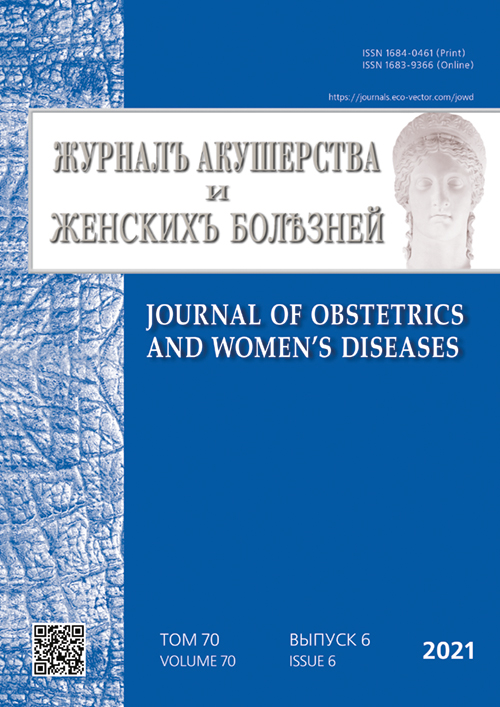Течение и исходы беременности при хирургической коррекции истмико-цервикальной недостаточности. Оценка рисков
- Авторы: Мамедова М.А.1,2, Ильин А.Б.1,2, Столица А.А.2, Шеерман Е.А.1
-
Учреждения:
- Первый Санкт-Петербургский государственный медицинский университет им. акад. И.П. Павлова
- Родильный дом № 1 (специализированный)
- Выпуск: Том 70, № 6 (2021)
- Страницы: 41-48
- Раздел: Оригинальные исследования
- Статья получена: 29.07.2021
- Статья одобрена: 21.10.2021
- Статья опубликована: 15.12.2021
- URL: https://journals.eco-vector.com/jowd/article/view/77028
- DOI: https://doi.org/10.17816/JOWD77028
- ID: 77028
Цитировать
Аннотация
Обоснование. Одной из самых значимых причин невынашивания беременности является истмико-цервикальная недостаточность. Для коррекции истмико-цервикальной недостаточности во время беременности применяют хирургические и консервативные методы лечения. К хирургическим методам коррекции относится наложение шва на шейку матки — цервикальный серкляж, который делят на три категории: профилактический, терапевтический и экстренный.
Цель — сравнить клинический эффект профилактического и терапевтического серкляжа на течение и исходы беременности у женщин с цервикальной недостаточностью.
Материалы и методы. Выполнено проспективное исследование на базе СПбГБУЗ «Родильный дом № 1 (специализированный)». Под наблюдением находились 106 беременных в возрасте 20–45 лет, которым проводили хирургическую коррекцию истмико-цервикальной недостаточности при сроках беременности от 14 до 24 нед. включительно в сочетании с интравагинальным введением микронизированного прогестерона. Женщины были разделены на две группы. Первую группу (30 человек) составили пациентки без структурных изменений шейки матки, которым был проведен профилактический серкляж; вторую группу (76 человек) — беременные, которым был выполнен терапевтический серкляж. Исследование гормонального статуса: изучение анамнеза в отношении менструальной и репродуктивной функций; определение наличия и типа ожирения, степени выраженности вторичных половых признаков при осмотре женщин. При осмотре шейки матки в зеркалах, ультрасонографии оценивали анатомические причины невынашивания беременности. Проводили трансвагинальную ультрасонографию в динамике. Определяли маркеры воспалительной реакции (клинический анализ крови и уровень С-реактивного белка), показатели биохимического анализа крови, коагулограммы. Исследовали мазок на микробиоценоз и посев из цервикального канала. Оценивали pH-баланс влагалища.
Результаты. Соотношение количества пациенток без структурных изменений шейки матки, которым был проведен профилактический серкляж и беременных, которым был выполнен терапевтический серкляж, составляет 28 к 72 %. Это свидетельствует о том, что 28 % пациенток с истмико-цервикальной недостаточностью поступили в специализированный стационар с результатами обследований и прегравидарной подготовкой. Остальные 72 % женщин впервые обследовались уже с осложненным течением очередной беременности.
Заключение. Исследование показало, что хирургическая коррекция является эффективным методом предотвращения поздней потери плода. Профилактический серкляж обладает рядом преимуществ — сокращаются время манипуляции, количество осложнений и время пребывания беременной в стационаре. Проведение хирургической коррекции истмико-цервикальной недостаточности позволило добиться пролонгирования беременности до рождения жизнеспособного плода у всех женщин, что является хорошим резервом для снижения показателей перинатальной заболеваемости и смертности. Остается актуальным вопрос своевременной диагностики и хирургической коррекции истмико-цервикальной недостаточности.
Ключевые слова
Полный текст
Об авторах
Мехри Аймамедовна Мамедова
Первый Санкт-Петербургский государственный медицинский университет им. акад. И.П. Павлова; Родильный дом № 1 (специализированный)
Автор, ответственный за переписку.
Email: mmekhri@gmail.com
канд. мед. наук
Россия, Санкт-ПетербургАлексей Борисович Ильин
Первый Санкт-Петербургский государственный медицинский университет им. акад. И.П. Павлова; Родильный дом № 1 (специализированный)
Email: a-ilyin@inbox.ru
канд. мед. наук, доцент
Россия, Санкт-ПетербургАлександр Анатольевич Столица
Родильный дом № 1 (специализированный)
Email: alexstolica@yandex.ru
Россия, Санкт-Петербург
Екатерина Андреевна Шеерман
Первый Санкт-Петербургский государственный медицинский университет им. акад. И.П. Павлова
Email: sheermanekaterina@gmail.com
Россия, Санкт-Петербург
Список литературы
- Информационный бюллетень ВОЗ: Преждевременные роды [дата обращения: 20.07.2020]. Доступ по ссылке: https://www.who.int/ru/news-room/fact-sheets/detail/preterm-birth
- Romero R., Yeo L., Miranda J. et al. A blueprint for the prevention of preterm birth: vaginal progesterone in women with a short cervix // J. Perinat. Med. 2013. Vol. 41. No. 1. P. 27–44. doi: 10.1515/jpm-2012-0272
- Петров Ю.А., Алехина А.Г., Блесманович А.Е. Преждевременные роды при истмико-цервикальной недостаточности // Журнал научных статей «Здоровье и образование в XXI веке». 2018. Т. 20. № 4. С. 115−119. doi: 10.26787/nydha-2226-7425-2018-20-4-115-119
- Истмико-цервикальная недостаточность. Клинические рекомендации (протокол лечения). Письмо МЗ России от 28 декабря 2018 г. № 15-4/10/2-7991 [дата обращения: 23.08.2021]. Доступ по ссылке: https://rulaws.ru/acts/Pismo-Minzdrava-Rossii-ot-28.12.2018-N-15-4_10_2-7991/
- McDonald I.A. Suture of the cervix for inevitable miscarriage // J. Obstet. Gynaecol. Br. Emp. 1957. Vol. 64. P. 346−350. doi: 10.1111/j.1471-0528.1957.tb02650.x.
- Shirodkar V.N. A new method of operative treatment for habitual abortions in the second trimester of pregnancy // Antiseptic. 1955. Vol. 52. P. 299−300.
- Riiskjaer M., Petersen O.B., Uldbjerg N. et al. Feasibility and clinical effects of laparoscopic abdominal cerclage: an observational study // Acta Obstet. Gynecol. Scand. 2012. Vol. 91. No. 11. P. 1314−1318. doi: 10.1111/aogs.12001
- Тетруашвили Н.К., Агаджанова А.А., Милушева А.К. Экстренный серкляж: показания, противопоказания, возможности медикаментозного лечения // Доктор.Ру. 2019. No. 11 (166). С. 11–13. doi: 10.31550/1727-2378-2019-166-11-11-13
- Brown R., Gagnon R., Delisle M.F. No. 373-Cervical insufficiency and cervical cerclage // J. Obstet. Gynaecol. Can. 2019. Vol. 41. No. 2. P. 233−247. doi: 10.1016/j.jogc.2018.08.009
- Preterm labour and birth. NICE guideline [NG25] [дата обращения: 23.08.2021]. Доступ по ссылке: https://www.nice.org.uk/guidance/ng25
- ACOG Practice Bulletin No.142: Cerclage for the management of cervical insufficiency // Obstet. Gynecol. 2014. Vol. 123. No. 2 Pt. 1. P. 372−379. doi: 10.1097/01.AOG.0000443276.68274.cc
- Хамадьянов У.Р., Саубанова Т.В., Потемкина Е.В., Хамадьянова А.У. Особенности ведения беременности у женщин с истмико-цервикальной недостаточностью до и после хирургической коррекции // Вестник Российского университета дружбы народов. Серия: Медицина. 2011. № S5. С. 92−97.
Дополнительные файлы












